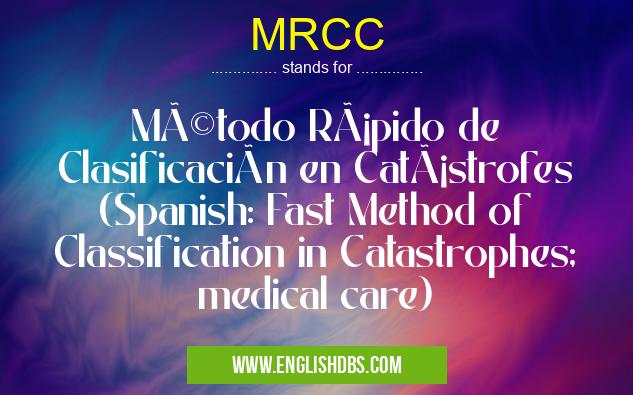What does MRCC mean in HEALTHCARE
MRCC stands for Método Rápido de Clasificación en Catástrofes (Spanish for Fast Method of Classification in Catastrophes). It is a medical care protocol used to quickly and efficiently triage patients in disaster situations.

MRCC meaning in Healthcare in Medical
MRCC mostly used in an acronym Healthcare in Category Medical that means Método Rápido de Clasificación en Catástrofes (Spanish: Fast Method of Classification in Catastrophes; medical care)
Shorthand: MRCC,
Full Form: Método Rápido de Clasificación en Catástrofes (Spanish: Fast Method of Classification in Catastrophes; medical care)
For more information of "Método Rápido de Clasificación en Catástrofes (Spanish: Fast Method of Classification in Catastrophes; medical care)", see the section below.
» Medical » Healthcare
Definition
MRCC is a color-coded triage system that classifies patients based on the severity of their injuries or illnesses. The system uses four colors: red, yellow, green, and black.
- Red: Patients with life-threatening injuries or illnesses who require immediate medical attention.
- Yellow: Patients with serious injuries or illnesses who require urgent medical attention.
- Green: Patients with minor injuries or illnesses who can wait for medical attention.
- Black: Patients who are deceased or have injuries that are so severe that they are unlikely to survive.
Triage Process
MRCC triage is typically performed by trained medical personnel, such as doctors, nurses, or paramedics. The triage team assesses each patient's condition, including their vital signs, injuries, and level of consciousness. Based on this assessment, the patient is assigned a color code.
Benefits of MRCC
MRCC provides several benefits in disaster situations, including:
- Rapid Triage: The system allows for quick and efficient triage of patients, ensuring that those with life-threatening injuries receive immediate attention.
- Standardization: MRCC uses a standardized color code, which ensures that triage decisions are consistent and objective.
- Communication: The color-coded system provides clear and concise communication between triage teams and other healthcare providers.
- Resource Allocation: MRCC helps to allocate scarce medical resources effectively by prioritizing patients with the most urgent needs.
Essential Questions and Answers on Método Rápido de Clasificación en Catástrofes (Spanish: Fast Method of Classification in Catastrophes; medical care) in "MEDICAL»HEALTHCARE"
What is the MRCC?
The MRCC, or Método Rápido de Clasificación en Catástrofes, is a rapid triage method used in disaster situations to prioritize medical care. It helps medical professionals quickly assess and categorize injured patients to ensure that those with the most urgent needs receive immediate attention.
How does the MRCC work?
The MRCC uses a simple, color-coded system to classify patients based on their condition. Patients are assigned to one of four categories:
- Red: Critical patients with life-threatening injuries who require immediate medical attention.
- Yellow: Patients with serious injuries who require urgent medical care.
- Green: Patients with minor injuries who can wait for non-urgent medical care.
- Black: Patients who are deceased or have injuries that are too severe to survive.
Who uses the MRCC?
The MRCC is typically used by first responders, such as paramedics, nurses, and doctors, in disaster situations, such as earthquakes, hurricanes, and terrorist attacks. It allows them to quickly assess and prioritize patients, ensuring that the most critical cases are treated first.
What are the benefits of using the MRCC?
Using the MRCC in disaster situations has several benefits, including:
- Rapid triage: The MRCC allows medical professionals to quickly assess and categorize a large number of patients, saving valuable time in critical situations.
- Prioritization of care: By identifying patients with the most urgent needs, the MRCC helps ensure that those patients receive immediate medical attention.
- Improved patient outcomes: By providing prompt and appropriate care to critically injured patients, the MRCC can help improve patient outcomes and reduce mortality.
What are some limitations of the MRCC?
While the MRCC is a valuable tool for triage in disaster situations, it has some limitations:
- Subjectivity: The MRCC relies on the judgment of individual medical professionals, which can lead to some subjectivity in the assessment and categorization of patients.
- Limited information: The MRCC is based on a limited assessment, which may not always provide a complete picture of the patient's condition.
- Communication: In chaotic disaster situations, it can be challenging to communicate the MRCC classifications effectively to other medical professionals and to the patients' families.
Final Words: MRCC is a valuable tool for triage in disaster situations. It provides a rapid, standardized, and effective method for classifying patients based on the severity of their injuries or illnesses. By ensuring that patients with life-threatening conditions receive immediate attention, MRCC helps to improve patient outcomes and save lives.
